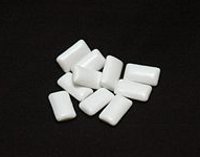Piece of gum your best and cheapest dentist?
 When chewing gum first appeared in Russia, children were the first ones to develop a liking for it. The adults did not consider chewing gum an appropriate behavior. Now everyone is chewing gum, and it has become an attribute of a healthy lifestyle.
When chewing gum first appeared in Russia, children were the first ones to develop a liking for it. The adults did not consider chewing gum an appropriate behavior. Now everyone is chewing gum, and it has become an attribute of a healthy lifestyle.

Every day white-toothed young people smile at us from TV screens. The idea is to make the consumer throw a pack of gum in a shopping cart during the next grocery trip. It is unlikely that we seriously believe that gum can make us better. Yet, we persuade ourselves that our teeth are more or less protected. So what can and what cannot be trusted in chewing gum ads?
It is believed that chewing gum can completely prevent cavities. The cause of tooth decay is the remnants of food that are not removed from the mouth and eventually cause destruction of the protective surface of the tooth. However, there are many other reasons, such as water, hereditary problems, all sorts of diseases and medications that cause cavities and tooth decay.
Chewing gum can prevent one cause of tooth decay. While it cannot get into hard-to-get mouth areas, saliva promoted by chewing creates additional "rinse" and, consequently, eliminates remnants of food.
However, in case of existing cavities the gum may get stuck in them and worsen the situation.
The jaws of contemporary people do little work. We are not used to long and thoughtful consumption of food, and our mandibular joints are not well trained and developed. To keep your mouth in a working tone, dentists advise to use chewing gum after every meal. Of course, this advice applies only if there is no inflammation or damage to the joints of the lower jaw.
In addition to dental benefits chewing gum also has digestive ones. Saliva, stimulated by additional chewing movements, increases our digestive activity. This allows for faster and easier digestion. The main thing is not to overdo it.
Chewing gum is also believed to improve concentration of attention. During the Korean War, American troops were supplied with special gum so that the soldiers could place greater focus to accomplishing their tasks. According to British scientists, the use of chewing gum can positively affect the development of memory. Russian teachers, on the contrary, believe that chewing distracts the students.
In any case, chewing gum should be consumed when appropriate.
There is no unified opinion whether children should chew gum. On the one hand, the strengthening of the jaw joints and improved digestion are important, on the other hand, chewing gum is not a necessity. Cavities can be easily prevented by performing the minimum requirements of hygiene, and a young body does not require additional stimulation of salivation to improve digestion. Children chewing gum can be seriously harmed by accidentally swallowing the gum that may get stuck in their throat.
Alexandra Grigorieva
Medpulse
Subscribe to Pravda.Ru Telegram channel, Facebook, RSS!


